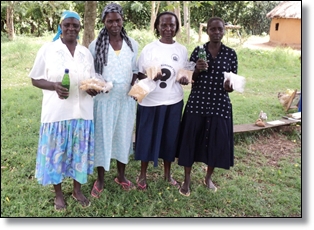Women Group Spearheads Poverty Battle
 |
| Some members of Bumanyi SHG |
Members of Bumanyi self help group from Nasira sub-location, Busibwabo location, Matayos division of Busia county in Kenya have a reason to smile.The community based organization [CBO] they started from scratch six years ago and nurtured amid several challenges has started to bear fruit. Formed in 2004 with only seven members, the group was officially registered with the department of social services on the 7th of April, 2005.
The community interest group’s chairperson Alice Nyongesa says that the group members’ main objective of the self help group is to establish a foundation of self reliance by engaging in income generating activities so as to bring the dependency syndrome to its death bed.
“The department of agriculture identified our village [Bumanyi] as one of the focal areas and gave us a grant to the tune of sh120, 000 under a programme known as “Njaa Marufuku Kenya [NMK]” in 2006,” the community interest group chairperson says, adding that they spent Kshs 75, 000 on a three day training workshop undertaken by the field officers from the department of agriculture.
According to the group's chairperson, the group members have been trained on how to make soap as well as fabric decoration such as Tie and Dye. The group members whose membership has since increased to 22 [5 men and 17 women] unanimously agreed to contribute Kshs 500 each totaling sh11, 000 to facilitate further training in Uganda where they were subsequently taken through the soap making process and how to manufacture cassava starch for ironing the clothes.
“Apart from soap making and Tie and Dye, the group members also engage in baking of cakes and sconces (which they sell to local shop owners and individuals); table banking, farming and disinfecting livestock from pests at a fee of five shillings per head,” Alice says.
The group shifted from manufacturing bar soaps and embarked on liquid soap whose raw material is locally available. This saves them from travelling all the way to either Eldoret or Nairobi to purchase the chemicals.
“We hope to transform our group into a cottage industry that will provide employment opportunities especially among the jobless youth in the area,” the chairperson says.
The group has supported its members with hybrid seed and fertilizers that have enabled them to reap a higher agricultural turnover. A beneficiary, Rosemary, observes that the group has enabled her to provide for her family, pay tuition fees and also buy learning materials for her children who go to a primary school within the neighbourhood.
Dismas, a village elder, says that the group has brought the community together adding that he pocket between Kshs 200 - 300 per week from the sale of the liquid soap, cakes and sconces - thanks to the skills learnt from the group.
“Our first customer is our stomach. During the agricultural field days, we grab the opportunity to sell our range of products to the participants and the public,” says Dismas, adding that their products are in high demand.
The group’s chairperson underscores the importance of group activities saying the local communities should come together, form groups and register them with the social development department so that they can be funded and be able to undertake various income generating activities aimed at making them self reliant.
“ We work hard, respect teamwork, focus on our future and that of our families and collaboration with relevant institutions to tackle the prevailing incidences of poverty,” the group members conclude.
By Gilbert Ochieng.
Freelance Journalist based in Busia district in Western part of Kenya.
